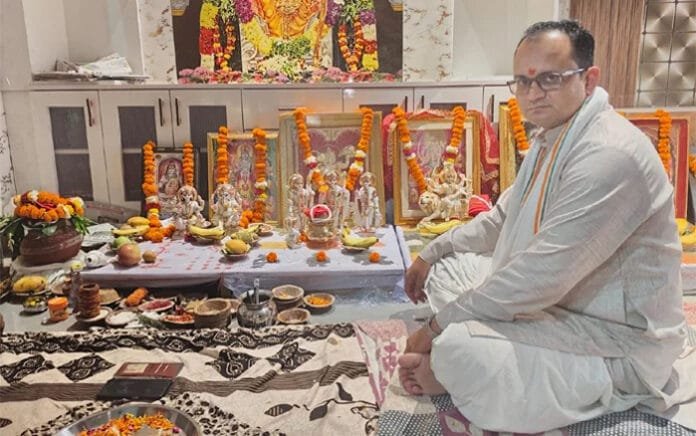The sacred month of Sawan, beginning this year from July 11, holds deep religious significance for Hindu devotees, especially followers of Lord Shiva. Each Monday, or Sawan Somvar, is considered highly auspicious for worship, devotion, and seeking divine blessings. However, according to renowned religious scholar Pandit Ajay Kaushik, not everyone should participate in this fast. There are clear scriptural guidelines and spiritual restrictions that must be respected to avoid unintended consequences.
Why Sawan Monday Is So Important for Shiva Devotees
The month of Sawan, also known as Shravan Maas, is believed to be the holiest time for worshipping Mahadev (Lord Shiva). Devotees across India engage in fasting, temple visits, and offering Jalabhishek to Shiva Lingams. It is believed that observing Sawan Somvar fasts brings peace, marital bliss, health, and prosperity.
There are four Sawan Mondays this year:
First Sawan Monday: July 14, 2025
Second Sawan Monday: July 21, 2025
Third Sawan Monday: July 28, 2025
Fourth Sawan Monday: August 4, 2025
These Mondays are considered divine and are marked by thousands of devotees taking Kanwar Yatra, chanting Har Har Mahadev, and keeping strict fasts. But the fasts are not suitable for everyone.
Who Should Not Observe the Sawan Monday Fast?
According to Vedic scriptures and ritual guidelines cited by Pandit Ajay Kaushik, there are three categories of individuals who should refrain from observing the Sawan Somvar fast due to health, purity, and spiritual reasons.
1. Individuals Suffering from Illness or Physical Ailments
Fasting is a form of spiritual discipline, but it must not come at the cost of physical well-being. People dealing with chronic diseases, digestive disorders, or undergoing medical treatment are strongly advised against fasting during Sawan.
Fasting can lead to deterioration in health for individuals with diabetes, blood pressure issues, or heart conditions.
Weakness caused by fasting may delay recovery or interfere with medication schedules.
It is more prudent to offer prayers, chant mantras, and perform Shiva Abhishek without compromising one’s health.
Health is also a divine blessing, and self-harm in the name of devotion is never recommended in Hindu Dharma.
2. Women During Menstrual Cycle
Women who are menstruating should not engage in Sawan Monday fasting or participate in religious rituals during this time. This is based on ritual purity norms outlined in ancient scriptures.
During menstruation, women are advised to avoid temple visits, fasting, or touching puja items.
If a woman has taken a Sankalp (vow) for 16 consecutive Mondays (Solah Somvar Vrat), she may continue the fast but must not perform rituals directly or engage with sacred objects.
They can mentally offer prayers, chant mantras silently, or listen to Shiva Katha without violating scriptural guidelines.
Maintaining spiritual discipline includes honoring bodily cycles as part of divine design.
3. Pregnant Women
Pregnancy is a delicate phase requiring maximum nourishment, hydration, and rest. Pandit Ajay Kaushik advises that pregnant women should never undertake Sawan fasts, as they may harm both the mother and the unborn child.
Fasting during pregnancy can lead to malnutrition, weakness, and low energy, which are unsafe for fetal development.
Spiritual duties can be carried out through non-physical forms of devotion—chanting Mahamrityunjaya Mantra, listening to Shiv Puran, and reciting Om Namah Shivaya.
Avoiding fasts is not a sin; rather, it shows respect for the life growing within, which is also a form of divine service.
How to Worship Lord Shiva in Sawan Without Fasting
For those unable to fast, alternative ways of expressing devotion are not only permissible but equally rewarding. Here are spiritually endorsed alternatives:
Perform Jalabhishek on Shiva Linga with water, milk, or honey.
Chant Om Namah Shivaya or the Mahamrityunjaya Mantra daily.
Offer Bael leaves, Dhatura, white flowers, and fruits to Lord Shiva.
Light a diya of pure ghee and incense in front of a Shiva idol or photo at home.
Read or listen to Shiva Mahimna Stotra, Shiv Chalisa, or Shiv Puran Katha.
Feed cows or the needy in the name of Lord Shiva.
Devotion lies in intention and action, not just in fasting rituals.
Special Considerations for 16 Somvar Vrat Observers
Those who have taken a vow to observe 16 consecutive Mondays of fasting should follow strict guidelines if they fall under any of the exempted categories:
In the case of illness or pregnancy, it is acceptable to pause or postpone the fast after consulting a qualified priest or spiritual guide.
Maintain purity of thought and speech, even if you are skipping the fast due to valid reasons.
Focus on Bhakti (devotion) rather than ritual rigidity.
Sawan Month: Dos and Don’ts for Every Devotee
Here are some additional rules to maximize your spiritual benefits during the month of Sawan:
Dos
Wake up before sunrise and take a bath with Gangajal if available.
Visit Shiva temples early morning and offer Panchamrit.
Chant the Rudra Ashtadhyayi or Rudram Chamakam if trained.
Observe celibacy, simplicity in speech, and maintain mental peace.
Consume only sattvic food and avoid onion, garlic, and non-vegetarian items.
Don’ts
Avoid consuming alcohol, meat, or tobacco during Sawan.
Don’t get into arguments, lies, or deceitful behavior.
Refrain from cutting hair, shaving, or nail trimming on Mondays.
Avoid late-night activities and maintain disciplined sleeping patterns.
Final Thoughts: Follow the Scriptures, Respect the Body
Sawan Somvar fasts are a divine opportunity to connect deeply with Lord Shiva, but not everyone is required—or even permitted—to fast. As Pandit Ajay Kaushik highlights, health and spiritual purity go hand in hand. The ultimate goal of any religious practice is to elevate the soul, not to cause physical or emotional harm.
Let us all embrace the sacred month of Sawan with reverence, mindfulness, and inclusiveness, choosing the path of devotion that suits our personal capacity and condition.













